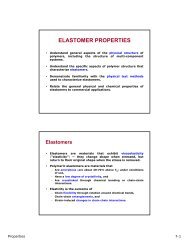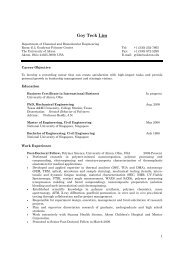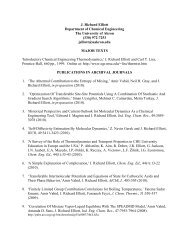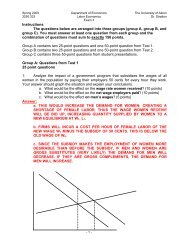Sociology of the Anarchists - Gozips.uakron.edu - The University of ...
Sociology of the Anarchists - Gozips.uakron.edu - The University of ...
Sociology of the Anarchists - Gozips.uakron.edu - The University of ...
You also want an ePaper? Increase the reach of your titles
YUMPU automatically turns print PDFs into web optimized ePapers that Google loves.
demonstrator-violence, but I'm not sure. (date)<br />
Smith (2001), writing in a premiere social movement journal called Mobilization, mars<br />
her o<strong>the</strong>rwise great article by conflating <strong>the</strong> property destruction and [police] violence in<br />
Seattle: “Anarchist groups... did not use violence first” (p. 13, my emphasis). She would<br />
have been right in saying that anarchists did not act first to provoke <strong>the</strong> police violence<br />
with property destruction.<br />
It is, unfortunately, not just a failure <strong>of</strong> liberal scholarship to see <strong>the</strong> distinction, but <strong>of</strong> <strong>the</strong><br />
activist Left, too. This is born out by <strong>the</strong> intense debates after “Seattle” amongst those<br />
active in <strong>the</strong> anti-corporate-globalization movement, and even those at its periphery,<br />
apparently hell-bent on sanitizing and controlling it.<br />
Plainly put, anarchists define violence as harm caused towards people, and—unless glass<br />
windows or brick walls are actually human beings—property destruction is not (in and <strong>of</strong><br />
itself) violent. Of course, it can be reckless, indirectly violent, a poor tactic, and so forth.<br />
But, as anarchist Chuck0 states: “ [find Chuck0 quote re: property destruction] “.<br />
Thus, by associating property destruction with violence, property is elevated to <strong>the</strong> level<br />
<strong>of</strong> human beings. By such logic, smashing a window would be as violent as smashing<br />
someone's face, or spray painting a wall as violent as etching words into someone's skin<br />
with a razor blade. Proudhon, <strong>the</strong> first “anarchist”, declared that property itself was <strong>the</strong>ft,<br />
thus claiming that property was in fact also a form <strong>of</strong> violence, since one can possess it to<br />
<strong>the</strong> detriment <strong>of</strong> ano<strong>the</strong>r.<br />
<strong>The</strong> ACME Collective (part <strong>of</strong> <strong>the</strong> Seattle “N30” black bloc), clarified this difference in a<br />
communique:<br />
Private property should be distinguished from personal<br />
property. <strong>The</strong> latter is based upon use while <strong>the</strong> former is<br />
based upon trade. <strong>The</strong> premise <strong>of</strong> personal property is that<br />
each <strong>of</strong> us has what s/he needs. <strong>The</strong> premise <strong>of</strong> private<br />
property is that each <strong>of</strong> us has something that someone else<br />
needs or wants. In a society based on private property<br />
rights, those who are able to accrue more <strong>of</strong> what o<strong>the</strong>rs<br />
need or want have greater power. By extension, <strong>the</strong>y wield<br />
greater control over what o<strong>the</strong>rs perceive as needs and<br />
desires, usually in <strong>the</strong> interest <strong>of</strong> increasing pr<strong>of</strong>it to<br />
<strong>the</strong>mselves. (ACME Collective 1999)<br />
It is also worth noting, in passing, <strong>the</strong> failure <strong>of</strong> liberals (let alone <strong>the</strong> media) to<br />
understand what <strong>the</strong> black bloc was (a group? a sect? a tribe from Eugene, Oregon?) and<br />
that it was not a new tactic, but had been used for many years in <strong>the</strong> US and in Europe.<br />
strong anarchist principles, as indicated in its organizational principles, which include a rejection <strong>of</strong><br />
capitalism/imperialism/feudalism and all o<strong>the</strong>r forms <strong>of</strong> domination, a belief in direct action and civil<br />
disobedience, and an organizational philosophy based on decentralization and autonomy. See Routledge<br />
(2003) for more on multi-scalar grassroots globalization networks. Also, see Ford (1999) for a<br />
pre-“Seattle” take on <strong>the</strong> PGA, contrasted with <strong>the</strong> NGO “insider” symposium on environment and<br />
sustainable development.<br />
[ Williams 90 ] [ this is a draft. do not cite. ]






